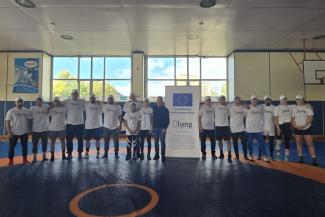Susaki-Irie Clash Already Set as Rivals Drawn Together in Opener
Friday, June 14, 2019 - 23:05 By Ken Marantz

TOKYO (June 15)---A potential match-up between two-time world champion Yui SUSAKI and nemesis Yuki IRIE in the women's 50kg class was one of the talking points heading into the All-Japan Invitational Championships.
It has become a reality far sooner than anyone imagined.
As fate would have it, Irie and Susaki were drawn to face each other in their opening match on Saturday, the third day of the four-day tournament also known as the Meiji Cup.
The tournament at Tokyo's Komazawa Gym is serving as the second of two national qualifiers for Japan's team to the World Championships in Kazakhstan in September.
As such and to better prepare the wrestlers, the Japan federation has set up the tournament using the same format as the worlds, most significantly by running all weight classes over two days, regardless of number of entries.
But it is the use of seedings that led to the marquee match-up more appropriate for a final.
The top two finishers at the All-Japan Championships in December, the first qualifying tournament referred to as the Emperor's Cup, were seeded. As Irie won the 50kg title there, she is the No. 1 seed at the Meiji Cup.
Susaki, however, missed the Emperor's Cup due to an elbow injury, and therefore went into the general draw. She was matched up with Irie in what will be a quarterfinal match.
Eri TOSAKA, the Rio 2014 gold medalist at 48kg, was placed in the other half of the draw, setting up a potential final with either Susaki or Irie.
Irie, who won the gold medal at the Asian Championships in April, defeated Susaki in the semifinals at the 2017 Emperor's Cup, but Susaki avenged that loss at the Meiji Cup the following spring.
That set up a playoff for the team to Budapest 2018, which Susaki won 6-4 before going on to successfully defend her world title.


Share your thoughts.
Comments